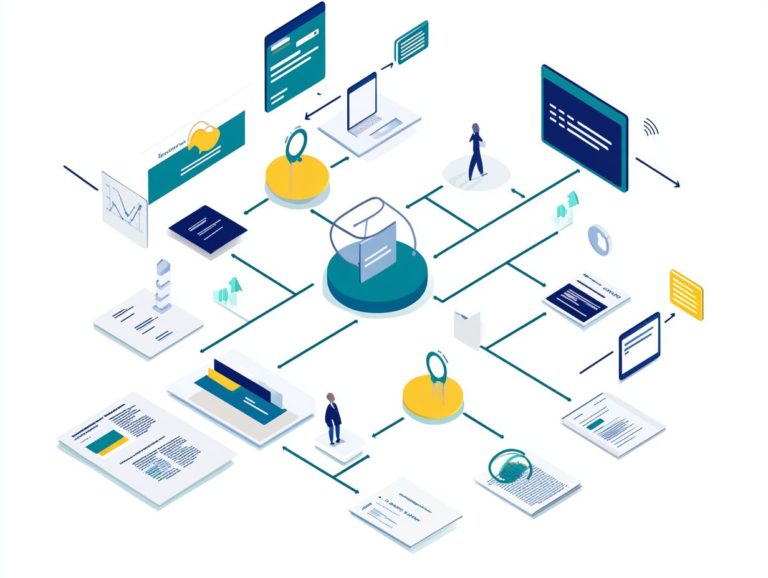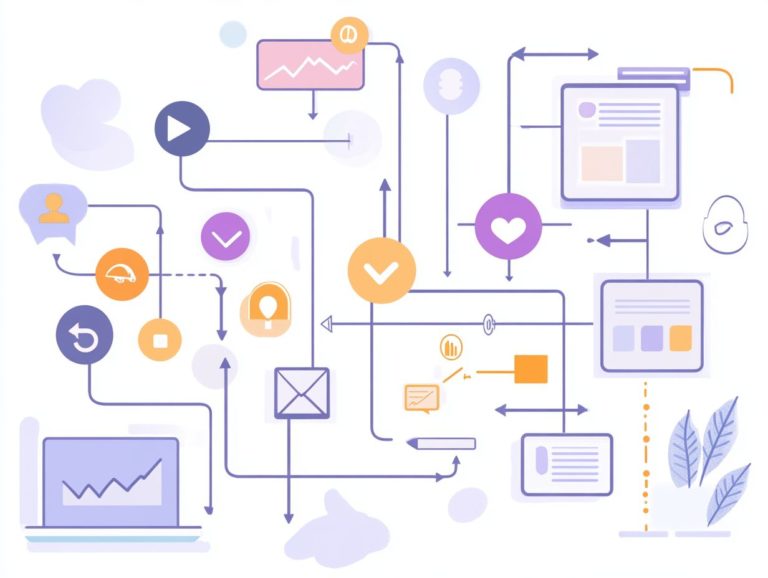How to Maintain Data Privacy in CRM Software?
In today s digital landscape, understanding CRM and data privacy is crucial for your business success! As you navigate customer data, ensure that it remains secure. This is not just a best practice; it’s essential.
This exploration delves into the significance of data privacy within CRM, pinpointing common risks and presenting effective strategies to safeguard sensitive information.
You’ll find key regulations to keep in mind, accompanied by practical steps for implementing robust data privacy measures in your CRM software. Dive in to discover how to protect your data while simultaneously enhancing customer trust.
Contents
- Key Takeaways:
- The Importance of Data Privacy in CRM
- Common Data Privacy Risks in CRM
- Best Practices for Maintaining Data Privacy in CRM
- Ensuring Compliance with Data Privacy Regulations
- Implementing Data Privacy Measures in CRM Software
- Frequently Asked Questions
- What is data privacy in CRM software?
- Why is it important to maintain data privacy in CRM software?
- What are some ways to maintain data privacy in CRM software?
- What should I look for in a CRM software to ensure data privacy?
- What are some common data privacy risks in CRM software?
- What should I do if there is a data privacy breach in my CRM software?
Key Takeaways:

- Data privacy protects sensitive customer information.
- It builds trust between businesses and clients.
- Identifying and addressing data privacy risks is essential for maintaining customer data security.
- Implementing strong security measures and compliance with regulations are key to maintaining data privacy in CRM software.
Understanding the Relationship Between CRM and Data Privacy
As a business leader, you must protect customer data and foster trust in an ever-evolving digital landscape. As you leverage sophisticated CRM systems to enhance engagement and streamline operations, you must also navigate the intricate web of data privacy regulations like the General Data Protection Regulation (GDPR) and the California Consumer Privacy Act (CCPA).
Ensuring robust data protection practices is not just about ticking legal boxes; it s about shielding your organization from security threats posed by cybercriminals eager to exploit personal information. By implementing comprehensive data protection strategies within your CRM platforms, you can fortify customer trust an invaluable asset in today’s competitive market.
For example, Salesforce offers integrated data privacy controls that empower users to take charge of their information, enhancing transparency and building confidence. Experian utilizes advanced analytics to secure data while helping businesses grasp customer preferences and privacy concerns.
Resources like the Identity Theft Resource Center present case studies demonstrating how effective communication regarding data protection can transform customer perceptions and drive loyalty, ultimately bolstering broader digital transformation efforts across various sectors.
The Importance of Data Privacy in CRM
The significance of data privacy in CRM is paramount. It acts as the cornerstone for cultivating customer trust and upholding a commendable brand reputation in today’s competitive landscape. With the surge in data breaches and identity theft incidents, it is imperative for you to prioritize the safeguarding of customer information to nurture enduring relationships.
As your organization embraces data-driven strategies, grasping and implementing robust data privacy measures is essential not only for compliance with regulations like GDPR but also for ensuring the security of personal information.
Why Data Privacy is Essential for CRM
Data privacy is absolutely essential for your CRM strategy because it safeguards sensitive customer information while building trust and loyalty key components for maintaining a competitive edge in today s marketplace. When you prioritize data protection, you not only comply with legal requirements but also create a secure environment that enhances customer experience and fosters engagement.
As the threat landscape continues to evolve with rising cybercriminal activities, implementing robust security measures, such as encryption and access control, becomes crucial for your CRM initiatives. By effectively protecting customer information, you can significantly boost loyalty; studies indicate that 70% of consumers consider data privacy a critical factor when selecting brands.
Compliance with regulations like GDPR not only helps you avoid hefty fines but also demonstrates corporate responsibility, resonating with socially conscious consumers. By adopting advanced technologies, you can fortify your data against breaches, ensuring that sensitive information remains confidential and minimizing vulnerabilities.
Organizations with strong data protection policies have reported a 25% increase in customer trust, highlighting the critical role of security in CRM strategies.
Now is the time to evaluate your current CRM practices and make necessary changes to enhance data security!
Common Data Privacy Risks in CRM

There are significant data privacy risks in CRM, including threats like data breaches, malware attacks, and phishing schemes. These risks can jeopardize sensitive customer information and erode the trust you’ve worked so hard to build.
As you implement CRM systems that gather extensive amounts of customer data, it’s crucial to remain vigilant against these vulnerabilities. Without strong security measures in place, your organization may unwittingly open the door to cybercriminals eager to exploit weaknesses and gain access to personal information. This ultimately undermines your data protection efforts.
Identifying and Addressing Potential Risks
Identifying and addressing potential risks in CRM systems is essential for maintaining data privacy and protecting customer information.
You must prioritize regular risk assessments to uncover vulnerabilities that could compromise sensitive data. This ongoing evaluation allows you to stay ahead of emerging threats and adjust your security measures.
Proactive steps include leveraging strong encryption methods that make data unreadable to anyone without permission. Implement systems that limit who can see or use sensitive information to ensure only authorized personnel can view or manipulate it.
Look at how major corporations like Salesforce and Microsoft have successfully established stringent data protection protocols. They effectively manage their data privacy risks while instilling trust among their users.
By continuously refining your systems and adopting best practices, you can significantly enhance the security of customer information and strengthen your overall data security framework.
Best Practices for Maintaining Data Privacy in CRM
Maintaining data privacy in CRM systems is essential for safeguarding customer information and ensuring compliance with regulations, all while nurturing trust and loyalty.
Implement a range of strategic measures to bolster data protection. This includes training your employees on data security protocols, utilizing encryption for sensitive information, and performing regular audits of your IT infrastructure.
By fostering a culture of security awareness and accountability, you can significantly mitigate the risk of data breaches and enhance customer trust in your CRM initiatives.
Effective Strategies for Protecting Data
Effective strategies for protecting data in CRM systems are essential for mitigating risks and ensuring compliance with data privacy regulations. These strategies might include:
- Implementing encryption techniques to secure sensitive customer data
- Establishing stringent access control measures
- Regularly updating software to address vulnerabilities
By proactively tackling security concerns, you can create a robust framework that safeguards customer information and fortifies overall data protection within your CRM processes.
Take Salesforce, for example. They have successfully integrated advanced encryption protocols that protect data both at rest and in transit. This dual-layered approach ensures that any information exchanged over networks remains secure against potential breaches.
By employing role-based access control, you can ensure that only authorized employees have access to sensitive customer data, significantly reducing the risk of internal threats.
When these measures are woven into broader compliance strategies, you demonstrate not only adherence to regulations but also a commitment to fostering trust among customers. This leads to long-term relationships and enhanced brand loyalty.
Ensuring Compliance with Data Privacy Regulations

Ensuring compliance with data privacy regulations such as GDPR and CCPA is crucial for any organization leveraging CRM systems. This not only safeguards customer data but also significantly reduces legal risks.
As legislation continues to evolve in response to heightened concerns surrounding data privacy, it s imperative for businesses to stay informed about these regulations and adapt their CRM practices. Your organization must act now to meet data privacy regulations and protect your customers.
Compliance entails a thorough understanding of the requirements surrounding data collection, processing, and storage, along with a commitment to transparency in how you handle customers’ personal information.
Key Regulations to be Aware of
Key regulations, like GDPR and CCPA, are essential frameworks for data protection and privacy. They shape how you manage customer information within your CRM systems. These regulations lay out specific requirements for data collection, processing, and storage. They underscore the importance of obtaining informed consent from individuals.
Grasping these regulations is crucial for achieving compliance and building customer trust. Failing to do so can lead to significant penalties and reputational damage.
With GDPR enforcing hefty fines that can soar up to 20 million or 4% of your annual global revenue, and CCPA imposing penalties of up to $7,500 per violation, it s imperative that you adopt stringent data management practices.
Rethink your CRM strategies by prioritizing transparency and user engagement. Integrate features that allow customers to easily access, modify, or delete their data. This ensures compliance while simultaneously enhancing customer satisfaction.
Organizations that use automated consent management tools have reported a 30% increase in customer trust levels. This showcases the tangible benefits of aligning with these regulations.
Implementing Data Privacy Measures in CRM Software
Implementing data privacy measures in your CRM software is crucial for safeguarding customer information and ensuring compliance with relevant regulations.
Incorporate a range of data protection techniques. Use methods like encryption a way of protecting data by converting it into a code that can only be read by someone with a key access control, and regular security audits to secure sensitive information within your CRM systems.
Proactively addressing potential vulnerabilities improves your security posture. It also helps you cultivate customer trust and loyalty in your CRM initiatives.
Steps for Enhancing Data Privacy in CRM
Enhancing data privacy in your CRM systems is essential if you aim to protect customer information and comply with data protection regulations. Begin by conducting a thorough assessment of your current CRM processes to identify any vulnerabilities.
Implement targeted security measures like encryption and access control. Train your employees regularly to strengthen your defenses. A proactive approach to data privacy significantly reduces risks and cultivates stronger relationships with your customers.
Establish a framework for ongoing monitoring of your CRM systems. This ensures they remain adaptable to emerging security threats. Regular audits and assessments allow you to evaluate the effectiveness of your measures.
Take, for example, a prominent retail company that successfully reduced breaches. They integrated automated monitoring tools while launching continuous employee education programs. These initiatives protect sensitive customer data and create a culture of security awareness within the organization, empowering employees to recognize and respond to potential vulnerabilities more effectively.
Frequently Asked Questions

What is data privacy in CRM software?
Data privacy in CRM software refers to the measures and protocols put in place to protect the sensitive information of customers and clients stored in a CRM system.
Why is it important to maintain data privacy in CRM software?
Maintaining data privacy in CRM software is important for protecting sensitive information, building trust and credibility with customers, and understanding GDPR compliance in CRM to adhere to privacy laws and regulations.
What are some ways to maintain data privacy in CRM software?
Some ways to maintain data privacy in CRM software include implementing strong security measures, regularly monitoring and auditing the system for potential vulnerabilities, and educating employees on proper data handling protocols.
What should I look for in a CRM software to ensure data privacy?
When choosing a CRM software, ensure it has advanced security features, clear data privacy policies, and compliance with relevant privacy laws and regulations. It should also include options for data encryption, access controls, and data backup.
What are some common data privacy risks in CRM software?
Some common data privacy risks in CRM software include data breaches, unauthorized access to sensitive information, and data loss due to system malfunctions or errors.
What should I do if there is a data privacy breach in my CRM software?
If there is a situation where someone accesses your private information without permission in your CRM software, act quickly! Investigate the cause and contain the breach immediately.
Notify anyone affected by this situation. It’s crucial to review and improve your security measures to protect against future breaches.






